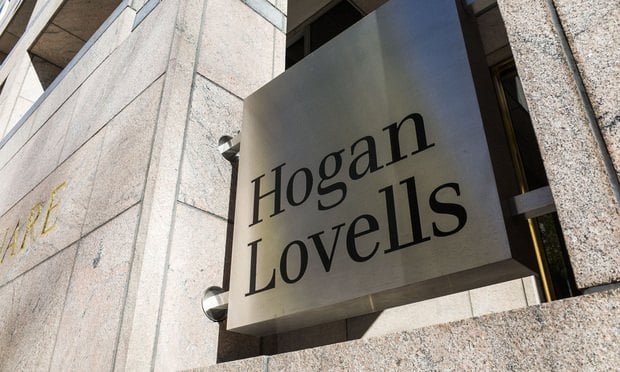Why a Private Equity Team Moved Back to Hogan Lovells a Year After Leaving
A conflict over a client is said to have been part of the reason behind the partner trio's return from Paul Hastings.
July 02, 2020 at 11:54 AM
7 minute read
 Hogan Lovells
Hogan Lovells
When Hogan Lovells announced last Monday it had rehired a private equity team that had joined Paul Hastings a year earlier, many people had questions. Why would the team leave and the rejoin so soon? Had something happened? Why would Hogan Lovells simply take them back?
When the team, comprising partners Ed Harris and Leanne Moezi in London, as well as partner Adam Brown in Northern Virginia, left to join Paul Hastings last July the hiring firm had described it as "another example of the calibre of talent our private equity practice attracts".
But while attracting talent is one thing, retaining it is quite another as Harris and his team soon discovered.
Four people with knowledge of the matter told Law.com International that they heard Harris had had a conflict with another London-based Paul Hastings partner over a client relationship. One former partner and a current partner at Hogan Lovells said they were told the client in question was private equity investor Pantheon.
He added: "Sometimes when two partners from different firms, but with the same client, move to a new firm, that's an issue they can encounter because both will claim it's their client."
Two former Hogan Lovells partners and a current partner at the firm also said they'd heard the team's fee rates may have been "too low" for Paul Hastings.
"Sometimes when two partners from different firms, but with the same client, move to a new firm, that's an issue they can encounter because both will claim it's their client."
A spokesperson for Paul Hastings said in a statement: "There appear to be a lot of rumours surrounding Ed's departure and client relationships. We do not comment on such matters but sincerely wish Ed and the team the very best on their return to Hogan Lovells."
Two people close to the situation said the reasons behind the team move were "a lot more complicated" than those issues.
Ed Harris and Hogan Lovells declined to comment on those matters. However, Harris told said he decided to rejoin Hogan Lovells "for the reasons I joined the firm in the first place", citing the firm's culture of collaboration, its offerings in global financial centres and the team's strong connections with colleagues.
He said: "In a prolonged period of remote working, that is extremely important to have colleagues whom you respect and know will serve our clients well."
He added that he is looking forward to growing the private equity practice, and "help it build out what it has been creating in the buyout space".
Filling a gap
Rehiring a team that had chosen to leave is not common practice. But Hogan Lovells' decision to rehire Harris and his colleagues did not come as a surprise to several former partners.
The firm had a gap in its corporate department following the departure of five London partners between August 2018 and October 2019, according to the firm's Companies House filings. All of them moved to U.S. firms in London, including: private equity partner Robert Darwin; corporate partner Steven Bryan; M&A partner Derek Meilman; the firm's former global head of private equity Tom Whelan and Ed Harris and his team.
And the firm had not made up the difference from its junior ranks. In this year's promotions round, the firm promoted one London-based corporate lawyer to the partnership.
The firm's private equity and funds team in London has 24 partners and 81 other lawyers. Critics might argue that its client list, featuring the likes of DWS Investments, growth investor Grafton Capital, the IFC and Santander Innoventures, does not feel as impressive as some of its private equity rivals.
However, Hogan Lovells' global head of the corporate and finance practice, David Gibbons, disagreed. He told Law.com International: "We are now a capable match for any of the leading corporate teams in the City. Indeed, most of our work is opposite the Magic Circle and elite U.S. firms."
Two former partners and two recruiters said that in the past year, the firm has been "desperate" to hire new corporate and private equity partners, and build up the practice in London. One former partner added the firm "would be pleased" with the team move because Harris "brings in business" and is "a good operator".
Another former partner said: "I think it's a win-win for the firm and the team. The firm would welcome them back with open arms, and it's a place where the team knows the people they're working with, it's an environment they're comfortable in."
Further growth
One former partner said it was important for Hogan Lovells to build up its transactional practice in the U.K. as the firm's profitability still lagged many of its U.S. competitors.
He said: "We're all looking for that rainmaker. It's a war for talent and client relationship. Hogan Lovells has been dipping its toes in the water with big potential private equity hires from good firms, but I think they probably got outbid every time."
David Gibbons denied this, saying: "Over the past five years, we do not believe there is a single situation where there was a lateral private equity partner that we were unable to recruit because we were outbid. We are a $2.4 billion business and have the financial wherewithal to compensate at competitive levels for the right talent."
However, he acknowledged that the firm has encountered "bumps" on the road to hiring private equity partners in London in the past year.
"We do not believe there is a single situation where there was a lateral private equity partner that we were unable to recruit because we were outbid"
Gibbons stressed that the firm sees the London corporate practice as "one of the key engines of the firm", and that there is "palpable ambition" within the corporate team to grow, private equity being a "significant part of that."
He added that the firm will be looking to promote corporate lawyers to the partnership in the coming years while still looking for strategic lateral partner hires.
However, despite the competitive nature of the private equity hiring space, he said the firm is not "interested in buying a book of business" but is rather more focused on making "a long term investment in individuals or teams" who can "fit in with our collegiate culture" and benefit from the firm's platform.
Given fitting in with the culture can always be a risk for any hiring firm, perhaps it could even make the hire of Harris and his team a low-risk move.
Read More:
Hogan Lovells Announces New UK Head in Global Shake Up
Hogan Lovells Hiked Revenues Again in Immelt's Last Full Year as CEO
This content has been archived. It is available through our partners, LexisNexis® and Bloomberg Law.
To view this content, please continue to their sites.
Not a Lexis Subscriber?
Subscribe Now
Not a Bloomberg Law Subscriber?
Subscribe Now
NOT FOR REPRINT
© 2025 ALM Global, LLC, All Rights Reserved. Request academic re-use from www.copyright.com. All other uses, submit a request to [email protected]. For more information visit Asset & Logo Licensing.
You Might Like
View All

Clifford Chance Further Modifies Lockstep to Better Reward Top Performers
2 minute read
UK Black History Month: Four A&O Shearman Staffers Honour Their Unsung Heroes
6 minute read
How Many Legal Jobs Will be Affected by AI? Law Firms Can't Agree
Law Firms Mentioned
Trending Stories
- 1Uber Files RICO Suit Against Plaintiff-Side Firms Alleging Fraudulent Injury Claims
- 2The Law Firm Disrupted: Scrutinizing the Elephant More Than the Mouse
- 3Inherent Diminished Value Damages Unavailable to 3rd-Party Claimants, Court Says
- 4Pa. Defense Firm Sued by Client Over Ex-Eagles Player's $43.5M Med Mal Win
- 5Losses Mount at Morris Manning, but Departing Ex-Chair Stays Bullish About His Old Firm's Future
Who Got The Work
J. Brugh Lower of Gibbons has entered an appearance for industrial equipment supplier Devco Corporation in a pending trademark infringement lawsuit. The suit, accusing the defendant of selling knock-off Graco products, was filed Dec. 18 in New Jersey District Court by Rivkin Radler on behalf of Graco Inc. and Graco Minnesota. The case, assigned to U.S. District Judge Zahid N. Quraishi, is 3:24-cv-11294, Graco Inc. et al v. Devco Corporation.
Who Got The Work
Rebecca Maller-Stein and Kent A. Yalowitz of Arnold & Porter Kaye Scholer have entered their appearances for Hanaco Venture Capital and its executives, Lior Prosor and David Frankel, in a pending securities lawsuit. The action, filed on Dec. 24 in New York Southern District Court by Zell, Aron & Co. on behalf of Goldeneye Advisors, accuses the defendants of negligently and fraudulently managing the plaintiff's $1 million investment. The case, assigned to U.S. District Judge Vernon S. Broderick, is 1:24-cv-09918, Goldeneye Advisors, LLC v. Hanaco Venture Capital, Ltd. et al.
Who Got The Work
Attorneys from A&O Shearman has stepped in as defense counsel for Toronto-Dominion Bank and other defendants in a pending securities class action. The suit, filed Dec. 11 in New York Southern District Court by Bleichmar Fonti & Auld, accuses the defendants of concealing the bank's 'pervasive' deficiencies in regards to its compliance with the Bank Secrecy Act and the quality of its anti-money laundering controls. The case, assigned to U.S. District Judge Arun Subramanian, is 1:24-cv-09445, Gonzalez v. The Toronto-Dominion Bank et al.
Who Got The Work
Crown Castle International, a Pennsylvania company providing shared communications infrastructure, has turned to Luke D. Wolf of Gordon Rees Scully Mansukhani to fend off a pending breach-of-contract lawsuit. The court action, filed Nov. 25 in Michigan Eastern District Court by Hooper Hathaway PC on behalf of The Town Residences LLC, accuses Crown Castle of failing to transfer approximately $30,000 in utility payments from T-Mobile in breach of a roof-top lease and assignment agreement. The case, assigned to U.S. District Judge Susan K. Declercq, is 2:24-cv-13131, The Town Residences LLC v. T-Mobile US, Inc. et al.
Who Got The Work
Wilfred P. Coronato and Daniel M. Schwartz of McCarter & English have stepped in as defense counsel to Electrolux Home Products Inc. in a pending product liability lawsuit. The court action, filed Nov. 26 in New York Eastern District Court by Poulos Lopiccolo PC and Nagel Rice LLP on behalf of David Stern, alleges that the defendant's refrigerators’ drawers and shelving repeatedly break and fall apart within months after purchase. The case, assigned to U.S. District Judge Joan M. Azrack, is 2:24-cv-08204, Stern v. Electrolux Home Products, Inc.
Featured Firms
Law Offices of Gary Martin Hays & Associates, P.C.
(470) 294-1674
Law Offices of Mark E. Salomone
(857) 444-6468
Smith & Hassler
(713) 739-1250








